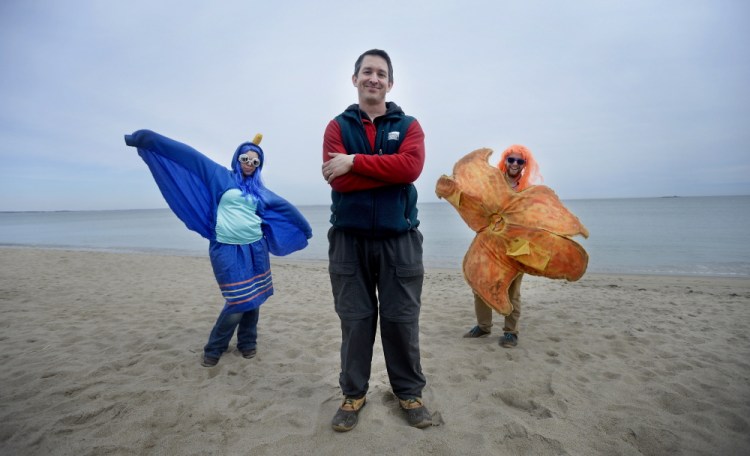Less screen time, more green time.
That’s what students get when they spend time at The Ecology School in Saco, where hands-on environmental education teaches them the ABCs of ecology and sustainability. No cellphones allowed.
“We like to say that we’re live and unplugged,” said executive director Drew Dumsch, who founded the organization as the Ferry Beach Ecology School in 1999. “We’re not anti-tech, but we’re here to get kids to interact with the real environment, not virtual.”
The Ecology School is our judges’ choice for the Source Educators Award. For 12 weeks in the spring and 10 weeks in the fall, Maine schools send children to visit the coastal campus or meet staff at some other outdoor venue – a state park, nature preserve or their own school grounds – to spend time exploring the outdoors and learning how everything in nature is connected. The program has grown so large now that at least a quarter if its programs are held off site.
There is also a residential program for extended stays at the school. During their stay, students are taught to notice patterns and natural processes in the world.
“What’s so great about residential environmental education programs is kids are living what they’re learning,” Dumsch said. “It’s not like a two-hour inside classroom. They’re going out to these great ecosystems like the tide pools and the forests and the salt marsh and learning about how those healthy ecosystems function, but then taking those lessons back to their school community and their home life.”
Last term, the school marked its 120,000th participant in all of its programs.
Students from Lebanon Elementary School and the Hanson School in Lebanon and have been participating for years. Typically, they visit Ferry Beach every year from kindergarten to the fifth grade, and Ecology School staff visit their classrooms to put on a field study workshop. The fifth grade is the students’ “capstone year,” when they get to stay at the coastal campus for four days.
Principal Tom Ledue says that for those fifth graders, the residential program is “a powerful, even transformative experience.”
“When you look at the children we serve, a lot of our kids are never going to see the ocean if they don’t have this program,” Ledue said.
Other students have never experienced a family-style meal like the ones they’re served at the school. For many, dinner at home is a frozen burrito heated in the microwave and eaten in front of the television. The school added a food systems component about 10 years ago called Food for Thought, which involves kids in everything from permaculture gardening on site to composting.
Dumsch views time spent at the school as an incubator for sustainability. Time spent there is not the end point, he said, but the beginning.
“Kids and teachers leave The Ecology School and aspire to make changes in their own life,” he said, even if that is just a small shift like not wasting food at the dinner table.
“We like to say that sustainability is applied eco- logy, that if you take ecological principals and you can figure out how to have that in the school community or workplace community, in economics, culturally and in our society, we’ll have more healthy, vibrant communities long-term,” Dumsch said.
The school recently started a research project in which it is interviewing former students about their Ecology School experience and how it affected them, even years later.
Dumsch said outdoor education is an experience he thinks all children should have. He recalls participating in 4-H programs when he was growing up, and birdwatching with his grandmother.
“Not every child has that dynamic with their family,” he said, “but every child should have the opportunity to come to a place like The Ecology School and spend a week on the coast of Maine and enjoy being outside.”
Send questions/comments to the editors.



